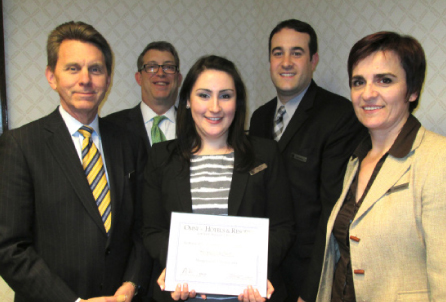The Healthy Hotel

By John D. Murtha
Doctors say that people who exercise, eat right, reduce stress, and have a balanced outlook on life stay healthy and live longer. So, could it be said that teamwork, having the right resources, maintaining a stable operation and fostering a productive culture will make a hotel healthier and more successful over time? Yes. A focus on keeping things “healthy” offers useful perspectives for hotel managers looking to enhance the culture and results of their operation.
Setting the Tone
The hotel I manage is home to a lot of history and more than 30 associates that belong to our 30+ Club signifying 30 or more years of service to the property. Their tenure is an important element of the atmosphere, culture, and success of the hotel. Part of my job is to make sure this special staff attribute is nurtured, applauded and contributes to the overall “tone” of the operation.
What’s a “tone”? It’s a style, a manner of being, or as Merriam-Webster says: “The state of a living body or of any of its organs or parts in which the functions are healthy and performed with due vigor.” Establishing a tone that infuses the operation with health and vigor is a critical step in cultivating success over time.
The GM is the one to take the lead on this, enrolling his or her management team in the tone-setting process. It starts with having shared goals and tactics for achieving outcomes. Then, it means fostering an atmosphere where people feel comfortable, recognized as individuals by everyone in the hotel (especially the GM) and acknowledged for their contributions.
A simple thing like noting an associate’s birthday goes a long way. As often as I can, I do so in person with the associate at their workplace, along with sending a card to their home. I also make a point of congratulating sales managers when they hit their monthly goal, or gently urge them on when they miss it. At those times, I find it works better to be a cheerleader and leave the coaching to their director.
Setting the tone includes being fair and consistent in all dealings with associates and guests, being easily accessible to everyone and telling the truth, even when it’s not easy to do so. But, it also means injecting some humor into the operation. The hotel business—and, it is a business—can be stressful at times, so keeping things light when the pressure’s on allows people to relax and perform better.
A Balanced Diet
Doctors also recommend a balanced diet as a way to stay healthy. The same advice works to keep hotels healthy. What constitutes a healthy diet for a hotel? In my view, it comes down to a balanced “feeding” of the primary constituent groups served by the property, including the owner, the guests, and the staff.
In order for a hotel to prosper over time, it must generate a reasonable return for the ownership entity that risked its capital in the first place. You need to pay bills on time, keep the property in great physical condition and acquire, develop, and retain a professional staff. This all requires sustained profitability.
The guest also needs to gain something from the hotel’s operation. Travelers expect personalized service, cleanliness in everything, modern systems, and good memories of their experience. You may very well be leaving some money on the table to generate high levels of guest satisfaction, but that comes with the territory when you’re looking for a balanced diet.
Your staff must be well served in the process, too. Fair rates of pay, good benefits, opportunities for training and advancement, personalized acknowledgement of their contributions to the operation, and consistent application of rules and regulations are essential elements of generating high degrees of employee satisfaction and low turnover. Again, some profit may be foregone to make sure that the staff is happy and taking good care of your guests. But it’s worth it.
Dual Health Benefits of MBWA
A few decades back, we learned that unstructured management by wandering (or walking) around (MBWA) was distinguished as a valid way to improve the morale and productivity of an organization. I think that MBWA is intuitive to most hoteliers because we know the best way to understand what’s happening in our hotels comes from being “on the floor” and responding to what we directly observe, rather than from reports, documents and other sources after the fact.
Japanese businesses use the notion go to gemba (“the real place”) to highlight the concept of having managers spend their time where the work is done. This approach asserts that direct experience best informs problem solving and process improvement.
MBWA is a great way to catch your associates performing well so you can acknowledge their contributions immediately or provide feedback for improvement, when needed. It also works to increase the amount of time you spend with guests, in the lobby and elsewhere throughout your property. One should use time spent at “the real place” productively and not simply to get out of the office.
The second benefit of MBWA is the health benefit to you, personally, from being on the floor. Some fitness experts claim that staying healthy requires a steady diet of 10,000 steps per day, which for a person of average height is about 4 ½ miles of walking. You may not be able to walk that much each day on-property, but practicing some level of daily, unstructured MBWA can reduce stress, keep you healthy and strengthen your operation.
Checking In
Another benefit of MBWA is that it’s probably the best way to experience how your associates are performing. You can then praise or coach them in “real” time. But there’s an important distinction in how to approach this task. It’s the difference between checking “on,” and checking “in,” with your staff.
Tip: Evaluate everyone involved in assembling and finalized your forecasts, then add to this list. You may find that a “more is merrier” approach will improve accuracy.
I suggest that checking “on” is based on an unstated belief that the person being monitored might have done something wrong—even unintentionally—that needs to be corrected. One checks on people to make sure they adhered to established standards and procedures, to verify that specific instructions have been precisely followed or requests have been fulfilled in an acceptable manner. Managers accustomed to checking “on” their colleagues use the phrase “inspect what you expect.”
On the other hand, checking “in” with an associate assumes no wrong-doing, but rather that you care about them and their work. Good morning! How’s it going today? Is everything okay? Can I give you a hand? Is anything missing? Did you get that report you needed? How’s our guest that needed some TLC yesterday? These are the questions posed by a manager checking “in” with, and not “on,” their associates.
The answers you receive and observations you make still alert you to problems that need to be addressed, but your comments based on the checking-in style will more likely be perceived by associates as support for their efforts, not criticism. I think this is a healthier management approach that works to ensure both guests and staff have a memorable experience of your hotel.

Praising Praise
Many hotels have an all-associate meeting, once a month or a quarter, sometimes known as a “Koffee Klatch”. At one of our recent meetings, most members of the
executive committee presented their team’s accomplishments for the previous year.
One member of the committee neglected to do so.
This particular division head knew immediately he’d made a mistake. His team had done quite a lot to improve the operation during the year and they deserved to be recognized in front of their peers. After the meeting, his team politely asked “Hey, what about us?” Be assured that the division head made up for the error at the next meeting.
I’ve normally found it easy to show gratitude to my staff for doing great work but wanted to know if there was evidence that doing so improves their well-being and results. I did some quick online research to see if any studies have shown a connection between showing gratitude and improved employee engagement. It turns out that lots of work has been done on this subject; here are some findings that I found interesting:
- Praising someone’s good work causes dopamine to be released in his or her brain. Dopamine is a chemical that is credited with generating feelings of pride and pleasure.
- Showing gratitude also increases feelings of goodwill in the person delivering the praise.
- People who don’t receive praise for their efforts report having the notion “What am I doing this for?” This implies that it’s not all about the money.
- Recognizing entire teams of associates for the value they add to the overall operation bolsters the enthusiasm of each member of the team and improves their standing within the organization. This is why we celebrate Housekeeping Week.
- Faint praise doesn’t work and neither do scheduled recognition ceremonies, at least not for very long.
- Appreciation and praise needs to happen on a regular basis under typical business conditions for it to be effective.
- Praise also needs to be very specific. A simple “great job” won’t suffice. Tell them exactly what they did that had you say “great job” in the first place.
- Rodd Wagner and Jim Harter, authors of 12: The Elements of Great Managing, said “Great managers are extremely effective in figuring out the best form of praise for each person. Some managers worry that they can give employees too much recognition. But the research shows that it’s extremely difficult to do that, as long as the recognition is right for the person.”

group as a whole.
Operating a busy hotel can be stressful at times so it’s in everyone’s best interest to avoid stress whenever possible. Here are some common business activities that most hoteliers wouldn’t typically describe as stress reducers but that I find work that way for my team and me:
Accurate Forecasts: If everyone in your operation knows what is really going to happen, then plans and resources will be aligned correctly. This is especially true when scheduling staff. Accurate forecasts lead to department schedules that appropriately match staffing with business levels, thus avoiding the last minute scrambling that occurs when solid information was absent during the scheduling process.Purchasing activities also benefit greatly from accurate forecasts. Haven’t you ever had to jump in your car to fetch something for the chef that he or she needs right now but didn’t buy sooner because the forecast was “off?”
Appropriate Meetings: Most of us who prefer to be on the floor don’t like to be in meetings, so start relating to them differently—as opportunities to reduce stress. The more that you and your associates know about what’s going to happen, the better that everyone can prepare to deal effectively with those upcoming realities. Your guests will benefit as well, from the friendly service that is naturally offered by relaxed, “in the know” staff members.
Handling Issues Immediately: Issues and the stress they create aren’t going to disappear until you and your staff deal with them head-on, so you might as well handle things quickly and completely. It’s the next best thing to having done it right in the first place, the best stress reducer of them all.
Further Reading
This material was originally published on my blog, “The Healthy Hotel”, at HOTELSMag.com. I hope that you’ll check out future postings and take the opportunity to share with other managers what you’ve done to improve the culture and results of your hotel.
